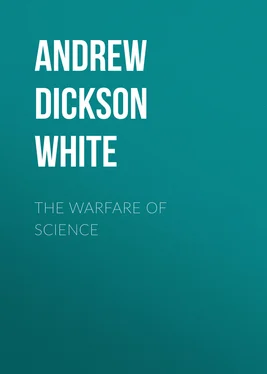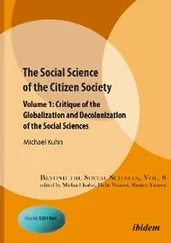Andrew Dickson White - The Warfare of Science
Здесь есть возможность читать онлайн «Andrew Dickson White - The Warfare of Science» — ознакомительный отрывок электронной книги совершенно бесплатно, а после прочтения отрывка купить полную версию. В некоторых случаях можно слушать аудио, скачать через торрент в формате fb2 и присутствует краткое содержание. Жанр: foreign_prose, foreign_religion, Философия, foreign_psychology, foreign_antique, на английском языке. Описание произведения, (предисловие) а так же отзывы посетителей доступны на портале библиотеки ЛибКат.
- Название:The Warfare of Science
- Автор:
- Жанр:
- Год:неизвестен
- ISBN:нет данных
- Рейтинг книги:5 / 5. Голосов: 1
-
Избранное:Добавить в избранное
- Отзывы:
-
Ваша оценка:
- 100
- 1
- 2
- 3
- 4
- 5
The Warfare of Science: краткое содержание, описание и аннотация
Предлагаем к чтению аннотацию, описание, краткое содержание или предисловие (зависит от того, что написал сам автор книги «The Warfare of Science»). Если вы не нашли необходимую информацию о книге — напишите в комментариях, мы постараемся отыскать её.
The Warfare of Science — читать онлайн ознакомительный отрывок
Ниже представлен текст книги, разбитый по страницам. Система сохранения места последней прочитанной страницы, позволяет с удобством читать онлайн бесплатно книгу «The Warfare of Science», без необходимости каждый раз заново искать на чём Вы остановились. Поставьте закладку, и сможете в любой момент перейти на страницу, на которой закончили чтение.
Интервал:
Закладка:
On the 24th of May, 1543, the newly-printed book first arrived at the house of Kopernik. It was put into his hands; but he was on his death-bed. A few hours later he was beyond the reach of those mistaken, conscientious men, whose consciences would have blotted his reputation, and perhaps have destroyed his life.
Yet not wholly beyond their reach. Even death could not be trusted to shield him. There seems to have been fear of vengeance upon his corpse, for on his tombstone was placed no record of his life-long labors, no mention of his great discovery. There were graven upon it affecting words, which may be thus simply translated: "I ask not the grace accorded to Paul, not that given to Peter; give me only the favor which thou didst show to the thief on the cross." Not till thirty years after did a friend dare write on his tombstone a memorial of his discovery. 27 27 Figuier , Savants de la Renaissance , p. 380. Also, Flammarion , Vie de Copernic , p. 190.
The book was taken in hand by the proper authorities. In due time it was solemnly condemned; to read it was to risk damnation; and the world accepted the decree. 28 28 The "proper authorities" in this case were the "Congregation of the Index," or cardinals having charge of the "Index Librorum Prohibitorum." Recent desperate attempts to fasten the responsibility on them as individuals seem ridiculous in view of the simple fact that their work is sanctioned by the highest Church authority, and required to be universally accepted by the Church. Three of four editions of the "Index" in my own possession declare on their title-pages that they are issued by order of the pontiff of the period, and each is prefaced by a special papal bull or letter. See, especially, Index of 1664, issued under order of Alexander VII., and that of 1761, under Benedict XIV. Copernicus's work was prohibited in the Index " donec corrigatur ." Kepler said that it ought to be worded " donec explicetur ." See Bertrand , Fondateurs de l'Astronomie Moderne , p. 57. De Morgan , pp. 57-60, gives the corrections required by the Index of 1620. Their main aim seems to be to reduce Copernicus to the groveling level of Osiander, making of his discovery a mere hypothesis; but occasionally they require a virtual giving up of the whole Copernican doctrine, e. g., "correction" insisted upon for cap. 8, p. 6. For scholarly account of the relation of the Prohibitory and Expurgatory Indexes to each other, see Mendham , Literary Policy of the Church of Rome .
The earnest theologians of the period immediately wheeled their batteries of sacred learning to support the Church in its effort to beat back the terrible doctrine that the earth revolves about the sun. Among the most vigorous of them in Northern Europe was Fromundus. From the shadow of the Cathedral of Antwerp he sent forth his famous treatise, the Anti-Aristarchus , full of the strongest arguments against the new theory. His very title-page was a contemptuous insult to the memory of Kopernik, since it paraded the assumption that the new truth was only an old and exploded theory of Aristarchus. He declares that "sacred Scripture fights against the Copernicans." To prove that the sun revolves about the earth, he cites the passage in the Psalms which speaks of the sun "which cometh forth as a bridegroom out of his chamber." To prove that the earth stands still, he quotes the passage from Ecclesiastes, "the earth standeth fast forever." To show the utter futility of the Copernican ideas, he indulges in scientific reasoning as he understands it—declaring that, if the hated theory were true, "the wind would constantly blow from the east; we should with great difficulty hear sounds against such a wind;" that "buildings, and the earth itself, would fly off with such a rapid motion;" and, greatest weapon of all, he works up, by the use of Aristotle and Thomas Aquinas, a demonstration from theology and science combined, that the earth must stand in the centre, and that the sun must revolve about it. 29 29 See Fromundus's book, cited above, passim , but especially the heading of chapter vi., and the argument in chaps, x. and xi. For interesting reference to one of Fromundus's arguments, showing by a mixture of mathematics and theology, that the earth is the centre of the universe, see Quetelet , Histoire des Sciences Mathématiques et Physiques , Bruxelles, 1864, p. 170.
Doubtless many will at once exclaim against the Roman Catholic Church for this. Justice compels me to say that the founders of Protestantism were no less zealous against the new scientific doctrine. Said Martin Luther: "People gave ear to an upstart astrologer, who strove to show that the earth revolves, not the heavens or the firmament, the sun and the moon. Whoever wishes to appear clever must devise some new system, which of all systems is, of course, the very best. This fool wishes to reverse the entire science of astronomy. But Sacred Scripture tells us that Joshua commanded the sun to stand still, and not the earth."
Melanchthon, mild as he was, was not behind Luther in condemning Kopernik. In his treatise, Initia Doctrinæ Physicæ , he says: "The eyes are witnesses that the heavens revolve in the space of twenty-four hours. But certain men, either from the love of novelty, or to make a display of ingenuity, have concluded that the earth moves; and they maintain that neither the eighth sphere nor the sun revolves.... Now, it is a want of honesty and decency to assert such notions publicly, and the example is pernicious. It is the part of a good mind to accept the truth as revealed by God, and to acquiesce in it." Melanchthon then cites passages from the Psalms and from Ecclesiastes which he declares assert positively and clearly that the earth stands fast, and that the sun moves around it, and adds eight other proofs of his proposition that "the earth can be nowhere, if not in the centre of the universe." 30 30 See Luther's Tischreden , Irmischer's Ausgabe . Also, Melanchthon's Initia Doctrinæ Physicæ . This treatise is cited under a mistaken title by the Catholic World , September, 1870. The correct title is as given above. It will be found in the Corpus Reformatorum , ed. Bretschneider , Halle, 1846. (For the above passage, see vol. xiii., pp. 216, 217.) Also, Lange , Geschichte des Materialismus , vol. i., p. 217. Also, Prowe , Ueber die Abhängigkeit des Copernicus , Thorn, 1865, p. 4. Also, note, pp. 5 and 6, where text is given in full.
And Protestant people were not a whit behind Catholic in following out these teachings. The people of Elbing made themselves merry over a farce in which Kopernik was the main object of ridicule. The people of Nuremberg, a great Protestant centre, caused a medal to be struck, with inscriptions ridiculing the philosopher and his theory. 31 31 For treatment of Copernican ideas by the people, see Catholic World , as above.
Then was tried, also, one piece of strategy very common formerly in battles between theologians themselves. It consists in loud shoutings that the doctrine attacked is outworn, and already refuted—that various distinguished gentlemen have proved it false—that it is not a living truth, but a detected lie—that, if the world listens to it, that is simply because the world is ignorant. This strategy was brought to bear on Kopernik. It was shown that his doctrine was simply a revival of the Pythagorean notion, which had been thoroughly exploded. Fromundus, as we have seen in his title-page and throughout his book, delights in referring to the doctrine of the revolution of the planets around the sun, as "that Pythagorean notion." This mode of warfare was imitated by the lesser opponents, and produced, for some time, considerable effect. 32 32 See title-page of Fromundus's work cited in note at bottom of p. 392; also, Melanchthon, ubi supra .
Интервал:
Закладка:
Похожие книги на «The Warfare of Science»
Представляем Вашему вниманию похожие книги на «The Warfare of Science» списком для выбора. Мы отобрали схожую по названию и смыслу литературу в надежде предоставить читателям больше вариантов отыскать новые, интересные, ещё непрочитанные произведения.
Обсуждение, отзывы о книге «The Warfare of Science» и просто собственные мнения читателей. Оставьте ваши комментарии, напишите, что Вы думаете о произведении, его смысле или главных героях. Укажите что конкретно понравилось, а что нет, и почему Вы так считаете.












